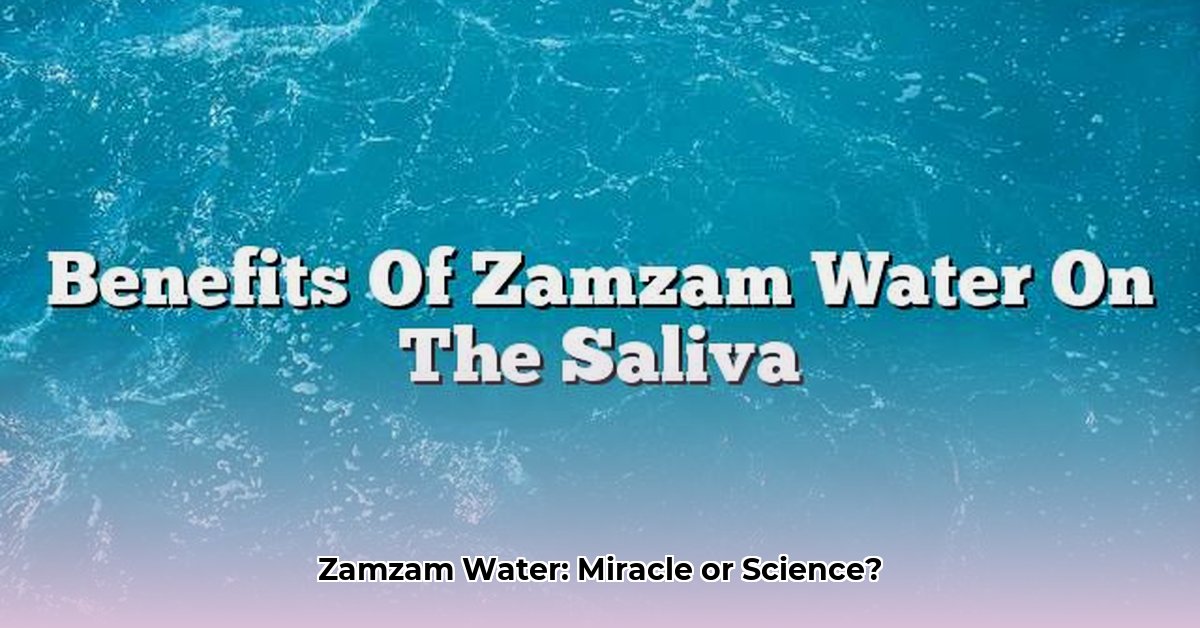
Zamzam Water: A Blend of Faith and Science
Zamzam water, originating from a well in Mecca, holds profound religious significance for Muslims worldwide. Beyond its spiritual importance, however, numerous claims about its health benefits circulate. This article aims to objectively examine these claims, exploring the available scientific evidence alongside the rich cultural and religious context surrounding Zamzam water. We will analyze its chemical composition, assess the validity of purported health benefits, and outline the need for further research.
Zamzam Water's Composition and Purity
Understanding Zamzam water's potential health effects necessitates analyzing its mineral composition and purity. While preliminary analyses suggest a unique mineral profile compared to other water sources, comprehensive and standardized data remain limited. Available information points to potentially higher levels of minerals like calcium and magnesium, but consistent and reliable data are needed for accurate comparison. Furthermore, consistent testing for contaminants, including levels of arsenic, is crucial to ensure safety and support any future health-related claims. Without such data, drawing any conclusions about potential health impacts remains premature. Is the mineral profile truly distinct, and how might these differences affect human health? More rigorous research is needed to provide definitive answers.
Claimed Health Benefits: A Critical Evaluation
Numerous health benefits are associated with Zamzam water, including improved digestion, increased blood platelet counts, and accelerated healing. However, the scientific evidence supporting these claims is largely anecdotal and lacks the rigor of robust clinical trials. For example, while some individuals report improved digestion, controlled studies are needed to establish a causal link between Zamzam water and digestive health, ruling out other factors. Similarly, claims regarding increased blood platelet counts require larger, well-designed studies with appropriate control groups to confirm any significant effect and account for the potential placebo effect. Attributing disease recovery solely to Zamzam water is premature and irresponsible; such claims should not replace necessary medical treatment. What level of scientific scrutiny is required before we can confidently assess the validity of these claims? The answer is clearly: substantial improvements in research design and methodology.
Scientific Limitations and Methodological Challenges
Several key limitations hinder the scientific evaluation of Zamzam water's purported benefits. The lack of large-scale, double-blind, placebo-controlled studies significantly hampers definitive conclusions. Many existing studies suffer from small sample sizes, inconsistent methodologies, and a lack of robust controls. This makes it difficult to isolate any genuine effects from the placebo effect, which is likely amplified by the deeply held religious beliefs associated with Zamzam water. Furthermore, the absence of standardized protocols for water sampling and analysis across various studies also limits the reliability and comparability of the obtained results. How can future research address these limitations and ensure robust, reproducible findings? Developing universally accepted protocols for Zamzam water analysis is paramount.
Religious and Cultural Perspectives
The profound religious significance of Zamzam water within Islam must be acknowledged and respected. For Muslims, Zamzam water is viewed as sacred and imbued with divine blessings, leading to strong beliefs in its healing properties. This firmly held faith plays a crucial role in shaping perceptions and experiences related to Zamzam water's potential health effects. It's crucial to emphasize the distinction between this faith-based perspective and the necessity for scientifically validated evidence to support claims of therapeutic benefits. How can we bridge the gap between faith-based beliefs and scientific inquiry regarding Zamzam water? Respectful dialogue and collaborative research are essential steps.
Conclusion: Towards a Balanced Understanding
In conclusion, while Zamzam water holds undeniable cultural and religious importance, the scientific evidence supporting its purported health benefits remains limited and inconclusive. The need for larger, rigorously designed studies with standardized methodologies is paramount. Future research must address existing methodological limitations, accounting for the placebo effect and cultural influences while ensuring the collection of reliable and comparable data. This balanced approach will allow for a more nuanced understanding of Zamzam water, respecting both its spiritual significance and the principles of scientific inquiry. Only then can we confidently assess its potential health impacts.